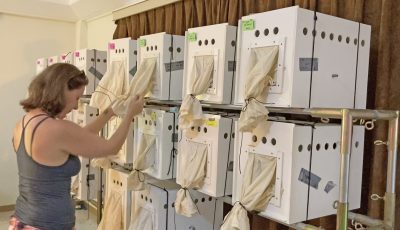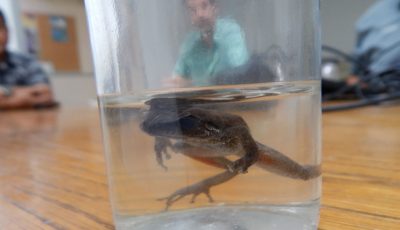DFW gets new dogs in fight vs tree snake
The CNMI has three new doggy protectors.
The Department of Lands and Natural Resources has acquired three new dogs that will help keep the CNMI free of brown tree snakes.
The dogs, Wendy, Keith, and Travis, are paired with handlers Kevin Lee T. Kapileo, Joshua Joseph Diaz Lizama, and Leonora Aldan Blas, who completed the CNMI Brown Tree Snake Canine Handler Training Program of the Division of Fish and Wildlife yesterday at the DLNR compound in Lower Base.
DFW director Manny M. Pangelinan said the six-month training taught the handlers how to effectively work with their dogs in combatting the possible entry of brown tree snakes into the Commonwealth.
The CNMI’s southernmost neighbor, Guam, is heavily infested by the invasive brown tree snake and all cargo, planes, and vessels from Guam are rigorously inspected to ensure that they have no stowaway brown tree snake that could possibly breed in the CNMI. “The BTS canine is the most important tool we have. Dogs have a very profound sniffing ability so they are able to sniff the snakes out,” Pangelinan said.
These new dogs will increase DFW’s ability to perform and make sure that the BTS program is more viable and effective. There are currently six BTS dogs, one of which has yet to be trained.
“Whenever we have a new dog, they have to go to a training program. We collaborated with [U.S. Department of Agriculture] trainers and instructors to do the evaluation, to review our training, and to see if our guys have met the standard,” Pangelinan said.
The brown tree snake is not venomous but does not have a local natural predator. Their entry would not only damage the economy but also CNMI biodiversity.
“Guam has over two million snakes, and the CNMI being close to Guam, there’s a lot of impact that could happen here,” Pangelinan explained. “The snakes will also eat all our birds and our geckos. Our birds eat the seeds and disperse them, and then become part of the ecosystem. The lizards balance our ecosystem by eating the other insects like mosquitoes and bugs. What will happen if they are gone? There would be more bugs, among other things. We would not have a balance.”
DFW is appealing to the community to help protect the islands by reporting any sighting of brown tree snakes to 28-SNAKE (287-6253).



























